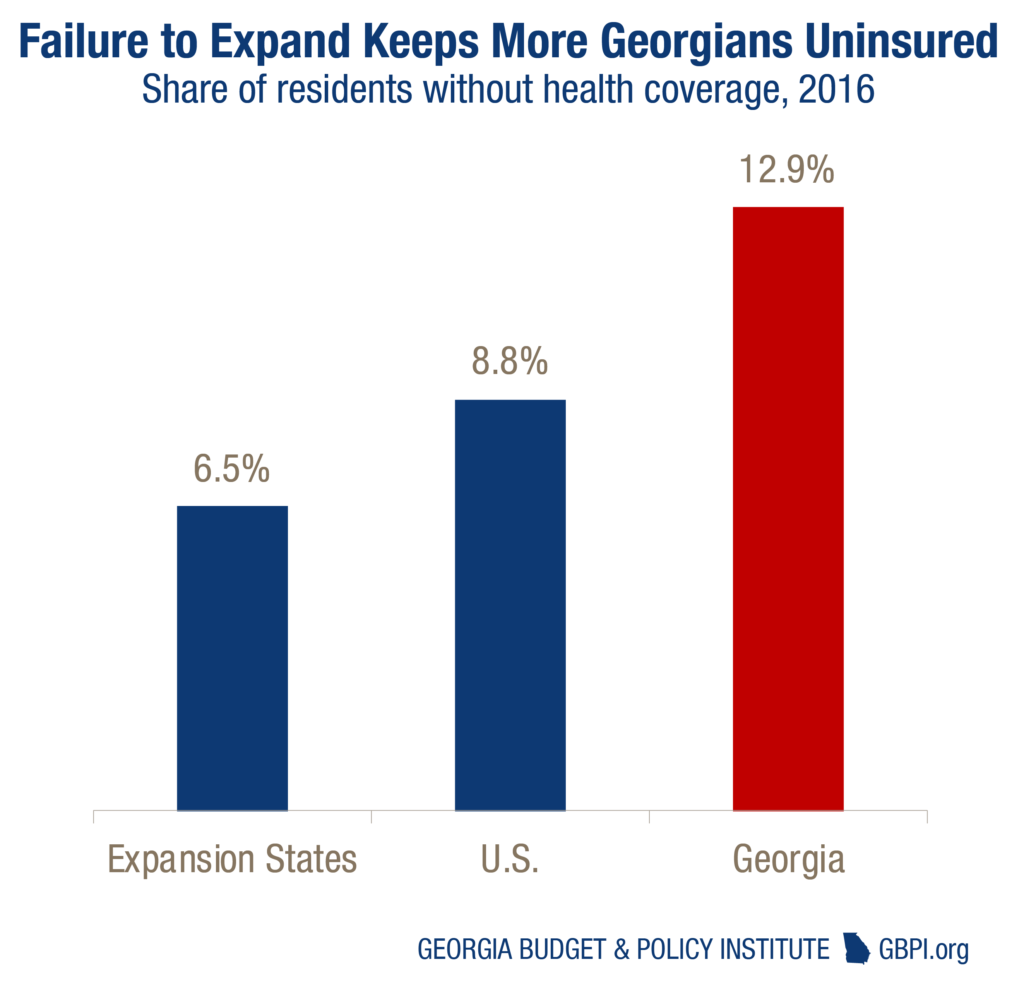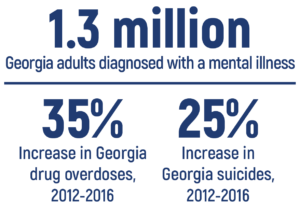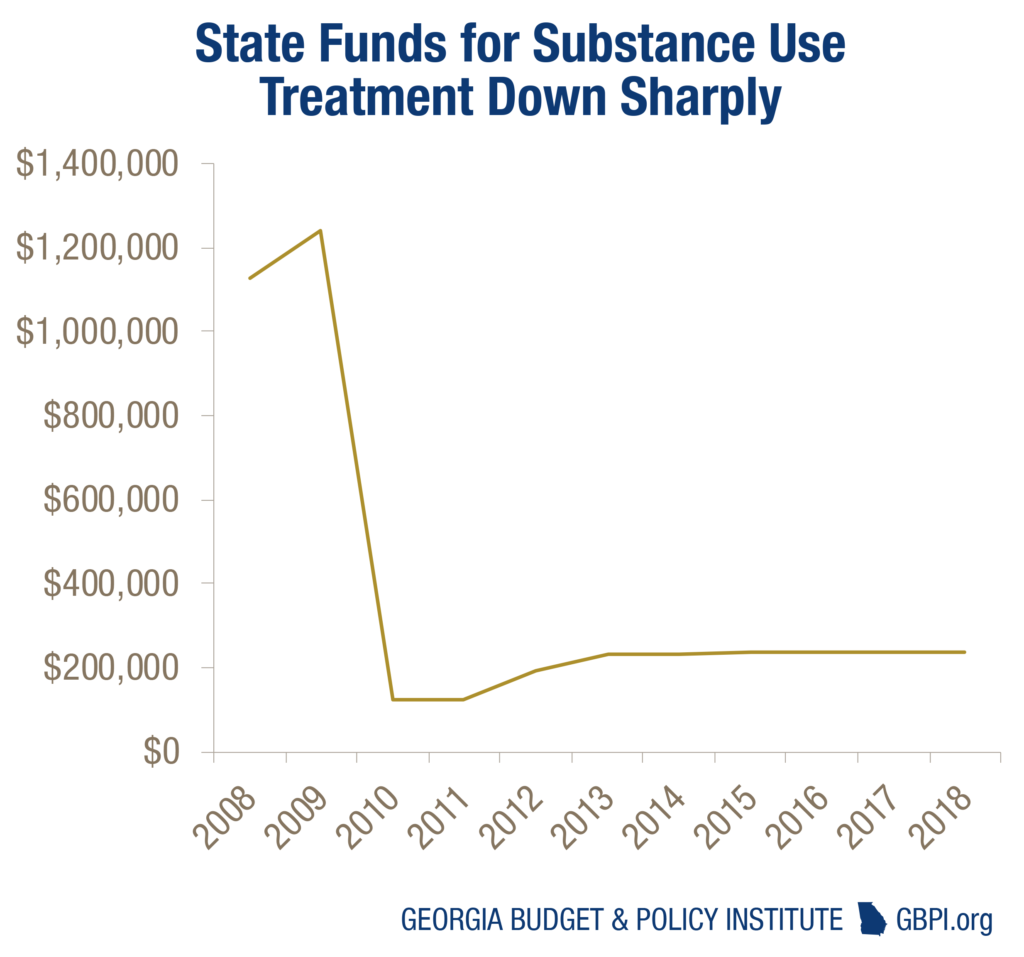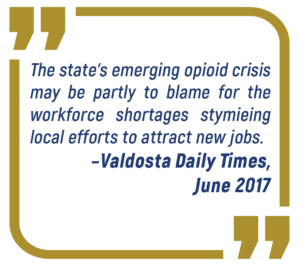Part of building a strong economy that makes good use of everyone’s potential is ensuring people are healthy so they can contribute. People are more likely to show up to work on time, get the job done right or start a new business when they’re able to see the doctor when they get sick or access targeted services for things like substance abuse treatment to get back on their feet and contributing to the fullest. Access to health care also protects people from the economic shock that can come with a sudden medical emergency or chronic illness.
Expand health coverage so workers and entrepreneurs can see a doctor.
When people can take care of their medical needs, it keeps them healthier and more productive and protects them from health-related financial shocks due to a health emergency or treatment for an expensive chronic illness.[80] Research also indicates that access to publicly funded coverage can help give potential entrepreneurs the confidence to take the risk of starting a new business.[81]
Georgia’s Medicaid program now provides critical access to care for about 2 million children, seniors, pregnant women and people with disabilities, yet state lawmakers fail to tap its full benefit. Only four states today spend less per Medicaid enrollee than Georgia does, limiting its reach and leaving many unable to access key services.[82] It also covers very few working-age adults, because lawmakers refused to expand the program under the federal health care law. That leaves about 240,000 Georgians stuck in the coverage gap, where they make too little to qualify for current subsides on the marketplace and too much to qualify for Medicaid under Georgia’s strict rules.[83]
Expanding Medicaid as most other states did can provide coverage to about 148,000 Georgians in working families.[84] It can also create 56,000 additional jobs each year and add $6.5 billion to the state’s economy, according to analysis by Georgia State University.[85]

A full expansion of Georgia’s Medicaid program costs an estimated $136 million a year over the next four years.[86] And every $1 of state money for expansion draws down an additional $9 from the federal government, a sound return on investment by any measure. Using federal dollars to pay for essential health services Georgia now pays for with state funds could also free up savings for budget-writers to invest in other needs such as mental health and substance abuse treatments.
More details: “Georgia Ready to Close the Coverage Gap,” GBPI, January 2018.
Invest in mental health and substance abuse treatments.
 More Georgians than in the past cope with a mental illness or substance use disorder, which if left untreated can pose a steep barrier to full participation in the economy. Still, most people hold the potential to get back on their feet and contribute to the workforce, as long as they’re able to get the consistent treatment they need.
More Georgians than in the past cope with a mental illness or substance use disorder, which if left untreated can pose a steep barrier to full participation in the economy. Still, most people hold the potential to get back on their feet and contribute to the workforce, as long as they’re able to get the consistent treatment they need.
About 1.3 million Georgia adults suffered with a diagnosed mental illness in the past year.[87] Mental health conditions are often underdiagnosed and undertreated, making the likely scope of mental illness even broader. Though mental illness and substance abuse do not necessarily cause one another, people with mental illness are more likely to experience a substance use disorder than people without one.[88]
Substance abuse problems are sharply on the rise, especially in Georgia’s mountain and rural areas. Drug overdose deaths in Georgia rose by 35 percent from 2012 to 2016, mainly due to the nationwide opioid epidemic. About 69 percent of overdose deaths in 2016 were related to opioids, including heroin and synthetic drugs such as oxycodone and morphine.[89]
State lawmakers made significant progress in recent years to improve behavioral health treatment for core challenges of mental health and drug addiction. But Georgia can afford to do even more. For example, state lawmakers withdrew nearly all support for substance use treatment during the Great Recession and funding still isn’t restored.

 Research shows that pre-arrest diversion programs for nonviolent drug offenders, more investment in early prevention programs and increased support for housing services can improve outcomes for people with mental health or substance use problems. A comprehensive strategy to embrace best-practice solutions and pair them with more resources can help stem the tide of the rising mental health and substance use crisis and give people a viable path to get back on their feet and contributing to the economy.
Research shows that pre-arrest diversion programs for nonviolent drug offenders, more investment in early prevention programs and increased support for housing services can improve outcomes for people with mental health or substance use problems. A comprehensive strategy to embrace best-practice solutions and pair them with more resources can help stem the tide of the rising mental health and substance use crisis and give people a viable path to get back on their feet and contributing to the economy.
More details: “Fight Substance Abuse, Improve Mental Health Care to Help More Georgians,” GBPI, Dec. 2017








